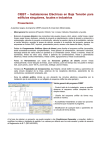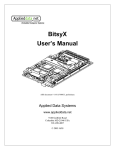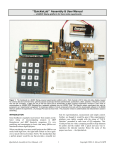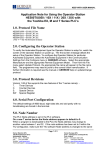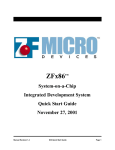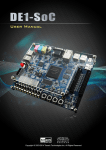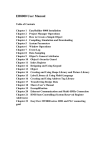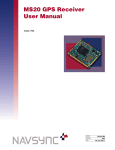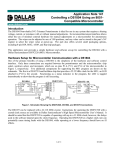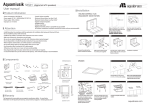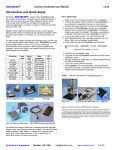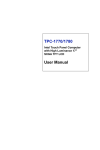Download SOM-A255F series user`s manual V1.00
Transcript
Your ePlatform Partner User’s Manual for Advantech SOM-A255F series module V1.00 User’s Manual Of Advantech RISC SOM-A255F Series Module System Module with Intel XScale PXA255 processor, SMI SM501 Graphic chip & Advantech EVA-C210 I/O enhance chip with Windows® CE.NET Released Version:V1.00 Released Date: May. 19. 2004 Advantech Co., Ltd Risc Embedded Computing Division http://www.advantech.com/risc Your ePlatform Partner User’s Manual for Advantech SOM-A255F series module V1.00 ABSTRACT This manual describes the SOM-A255F series module functions. Copyright This document is copyrighted, © 2003. All rights are reserved. The original manufacturer reserves the right to make improvements to the products described in this document at any time without notice. No part of this document may be reproduced, copied, translated or transmitted in any form or by any means without the prior written permission of the original manufacturer. Information provided in this document is intended to be accurate and reliable. However, the original manufacturer assumes no responsibility for its use, nor for any infringements upon the rights of third parties that may result from such use. Acknowledgements IBM, PC/AT, PS/2 and VGA are trademarks of International Business Machines Corporation. Intel® is trademark of Intel Corporation. Microsoft® Windows® CE.NET is a registered trademark of Microsoft Corp. All other product names or trademarks are properties of their respective owners. For more information on this and other Advantech products please visit our website at: http://www.advantech.com http://www.advantech.com/risc For technical support and service for please visit our support website at: http://eservice.advantech.com.tw/eservice/ Or directly mail to Advantech RISC platform application engineer: [email protected] Advantech RISC SOM design-in member can login-in the Advantech SOM Design-in Zone for professional & real-time technical support & service: http://risc-designin.advantech.com.tw PS. The RISC design-in zone web portal is only for SOM design-in member only. 2 Your ePlatform Partner User’s Manual for Advantech SOM-A255F series module V1.00 Revision History Version V1.00 Date Reason 2004.05.19 1st Official released version. (For 9696255201, 9696255801, 9696255F01 & 9696255F12) 3 Your ePlatform Partner User’s Manual for Advantech SOM-A255F series module V1.00 Chapter 1 SOM-A255F series Architecture 1.1 Introduction The SOM-A255F is WinCE ready, compact size module platform with SBC-function-level functionality that is emphasis at high performance VGA capability that offers Ultra low power consumption with comprehensive I/Os, SXGA LCD, Dual Display, Analogy VGA in/out put, Audio Interface into a compact 68x102x6.8mm size module. By the integration of Intel PXA-255 32-bit SoC and SMI SM-501 VGA controller, SOM-A255F is perfect for Multimedia, mobility, battery powered, great heavy display base embedded Internet appliance or so called smart embedded devices. SOM-A255F series Design highlight: - WinCE.NET-ready platform as functional system engine - Triple-Chip integration offers full SBC-level functionality on a 68 mm x 102 mm x 6.8 mm compact-sized module with 64/128 MB SDRAM/ fl ash on board - Ultra low power platform with additional high performance graphic controller (without embedded SDRAM) offers high mobility, fanless operation, multimedia and dual monitor display advantages - OS-ready package for Windows CE .NET/Linux Installation (Windows CE .NET 4.2 BSP ready) - Local bus (AMI Bus), comprehensive I/O interfaces, such as Ethernet, PS/2 ports, USB Host and PCI I/F support - Boot option by onboard Flash or CFC makes easy maintenance and cost savings - Design-in Kit Package available for complete design-in support - Optional RISC CE-Builder assist with customer image development SOM-A200 architecture SOM-A255x series are based on Advantech SOM-A200 architecture to 4 Your ePlatform Partner User’s Manual for Advantech SOM-A255F series module V1.00 design. SOM-A200 is Advantech RISC ultra-low power series SOM architecture. The following block diagram is the SOM-A200 architecture. Based on SOM-A200 architecture to design, SOM-A255x series have two kinds of PCB form factors. l SOM-A2552 & SOM-A2558 series: 68mm x 68mm x 6.8mm l SOM-A255F series: 68mm x 102mm x 6.8mm SOM-A255F benefit The SOM-A255F series are very compact (68mm x102mm x 6.8mm) and highly integrated system module. SOM-A255F series products have a standardized form factor and standardized connectors (DDR-SODIMM Memory Connector and two 100-pin board-to-board connectors) that carry a specified set of signals. This standardization allows users to create application-specified Customer Solution Board (CSB) which can accept a variety of present and future SOM-A series modules. SOM-A255F series include popular & common peripheral functions such as serial ports, Ethernet, USB, etc. The CSB designer can optimize exactly how each of these functions is physically implemented. Connectors can be placed precisely where they are needed for the application, on a baseboard designed to optimally fit the system configuration and layout. A CSB design may be used with a range of SOM-A255F series modules. This flexibility can be used to differentiate products at various price/ performance points, or to design “future proof” systems that have a built-in upgrade path. The modularity of an SOM-A255F solution also insures against obsolescence as computer technology continues to evolve. A properly designed SOM-A255F CSB can be used with several successive generations of SOM-A255F modules. An SOM-A255F CSB design thus has many of the advantages of a custom computer board design, but delivers better obsolescence protection, greatly reduced engineering effort, and faster time to market. Based embedded platform integrates both low-level hardware and software design and is always agreed to require heavy R&D resources, huge development effort, risk as well as long time to market lead-time. Moreover, the fast develop RISC SoC technology and short product life that has been challenging System Integrators how to make a right product development approach while foreseeing the huge advantage & benefit by adopting RISC-base solution. SOM-A255F series are an innovate platform architecture of WinCE.NET-ready complete functional system in a low profit module with SODIMM 200-pin unified I/O ready bus interface that is designed to fit into application-specified User Solution Board (CSB) with easy, risk-less, robust, fast implementation approach. Dual expansion interface and Pre-select Embedded OS also are well integrated on module. OS Board Support Package (BSP) and advantech own-develop system utility & tools are also supported for an easy design-in business philosophy. SOM-A255F series is designed for - High computing, graphic & I/O expansion platforms 5 Your ePlatform Partner User’s Manual for Advantech SOM-A255F series module V1.00 - Mobile, multimedia and battery-powered device platforms with large display & multi-I/O expansion demands Wireless broadband terminals Smart display devices Security surveillance platforms with digital or analog video input/output SOM-A255F series design-in package The Design-in Kit package provides developer complete reference design-in suit for application evaluation/ development and own User Solution Board (CSB) development. It contains the needed information, documentation and tools for starting their hands-on work as the followings items: l Target SOM (SOM-A255F-440B0): SOM-A255F standard version board. SOM-A255x series Reference Carrier Board (RCB): Sample CSB for developer reference. The board can be used in SOM-A255x series board. (SOM-A255x means SOM-A2552, SOM-A2558 and SOM-A255F) l 64MB compact flash card : the CF card is empty without any file inside. l SOM-A255x series support CD : includes - sample image & boot loader - manuals & datasheets - SOM-A255x series CSB design guide - S/W utility(upgrade utility, testing utility) - SOM-A255x series WinCE 4.2 BSP & SDK - Application note l Testing Set: It is designed for sample CSB or user own CSB/mass production test. It includes: H/W testing tools: RS232 loop-back testing tool, ADAM-4520 for RS485 testing, null MODEM cable, JTAG cable, USB ActiveSync cable, Audio cable, RS232 cable and RS485 cable. S/W testing Utility: Advantech-developed testing Utility. Testing process will be implemented by S/W testing Utility and H/W testing tools. Document: “User's manual of SOM-A255x series testing kit”. User can base on the documents to know how to implement testing process. l Software Development Tools: Software tools is the complete package for user developed their target image to align with their target CSB and applications - BSP: Binary Board Support Package of target SOM Design-in Kit. User can integrate their target WinCE platform in components & Apps & drivers - SDK: For user target Apps development - Reference Image: Reference Image for the selected model of SOM. - Bootloader: Bootloader for the SOM-A255x series board. 6 Your ePlatform Partner User’s Manual for Advantech SOM-A255F series module V1.00 - Upgrade Utility: User can use Upgrade utility to upgrade boot logo, image & bootloader. Except the Design-in package, Advantech also supply many types of LCD kits for users to reduce their developing effort. The LCD kit include the following items : l LCD l Inverter l Cables: includes LCD signals cable, Inverter signals cable. l Document: The LCD kit installation guide. Advantech supply the following LCD kits for user to choose l LCD-A057-STQ1-0 (Optional item) 5.7” STN QVGA LCD kit. The kit includes 5.7” STN QVGA LCD (NAN-YA/ LCBFBTB61M23), 4-wires resistive T/S, inverter, cables and installation guide. SOM-A2552 & SOM-A255F series don’t support 320*240 STN panel in this moment, if user have this kind of requirement, please contact with [email protected] or advantech regional sales for further support. l LCD-A064-TTV1-0 (Optional item) 6.4” TFT VGA LCD kit. The kit includes 6.4” TFT VGA LCD kit(PRIMEVIEW PD064VT2), 4-wires resistive T/S, inverter, cables and installation guide. All SOM-A255x series support this LCD kit in reference image. l LCD-A104-TTS1-0 (Optional item) 10.4” TFT SVGA LCD kit. The kit includes 10.4” TFT SVGA LCD (AUO/ G104SN03v2), 4-wires resistive T/S, inverter, cables and installation guide. Only SOM-A255F & SOM-A2552 series can support this LCD-out mode. l LCD-A150-TTX2-0 (Optional item) 15” TFT XGA LCD kit. The kit includes 15” TFT XGA LCD (AUO/ M150XN07), 4-wires resistive T/S, inverter, cables and installation guide. Only SOM-A255F & SOM-A2552 series can support this LCD-out mode. SOM-A255F series design-in kit(SOM-ADK255F-B00) is not included any LCD kit. If user needs LCD kit to evaluate, please order your suitable size LCD kit. Risc CE-Builder SOM-A255x series all support the Advantech optional RISC CE-Builder by developers can manage the BSP for their own platform development thru a friendly users interface over the web. RISC CE-Builder Solution is constituted by two parts: Web Image Builder and CE-TUner. Web Image Builder offers developers an online image building mechanism through a friendly user interface to remotely conduct low-level software and platform customization / integration for their target application without knowing / using Microsoft Platform Builder. The image building machine links to Advantech’s Board Support Package (BSP) library so developers can leverage Advantech’s low-level software solution database. 7 Your ePlatform Partner User’s Manual for Advantech SOM-A255F series module V1.00 CE-TUner is a powerful value-added system utility / tool suit for developers easily and simply develop, validate and upgrade their own SW platform solution. CE-Tuner helps users fine-tune their target SW image for optimized performance, verify settings, and platform tests before the production image is certified. RISC CE-Builder is not included in Design-in kit. If you need more information about it, please contact with [email protected] or advantech regional sales for further support. SOM-A255F Block diagram SOM-A255F series bases on triple-Chips design concept, SoC Intel XScale PXA255, Graphic chip SMI SM501 and Advantech I/O enhancement chip EVA-C210. The Block diagram is as following: 8 Your ePlatform Partner User’s Manual for Advantech SOM-A255F series module V1.00 SoC Intel XScale PXA255 introduction Intel XScale PXA255 processor is continuing the advance in handheld multimedia functionality. PXA255 is Low power, high performance 32-bit Intel XScale® core-based CPU (200, 300 and 400 MHz). The SoC is ARM Architecture v.5TE compliant. 0.18µ process for high core speeds at low power. Intel® Media Processing Technology including 40-bit accumulator and 16-bit SIMD to enhance audio/video decode performance. In power field, Low Power and Turbo modes enables enhanced optimal battery life. 32 KB data and 32 KB instruction caches, 2 KB Mini data cache for streaming data. About PXA255 I/O expansion function, Integrated Memory and PCMCIA/Compact Flash Controller with 100 MHz Memory Bus, 16-bit or 32-bit ROM/Flash/SRAM (six banks), 16-bit or 32-bit SDRAM, SMROM (four banks), as well as PCMCIA and Compact Flash for added functionality and expandability. System Control Module includes 17 dedicated general-purpose interruptible I/O ports, real-time clock, watchdog and interval timers, power management controller, interrupt controller, reset controller, and two on-chip oscillators. Peripheral Control Module offers 16 channel configurable DMA controller, integrated LCD controller with unique DMA for fast color screen support, Bluetooth** I/F, serial ports including IrDA, I2C, I2S, AC97, three UARTs(1 Full H/W flow control), SPI and enhanced SSP, USB end point interface, and MMC/SD Card Support for expandable memory and I/O functionality. About Intel PXA255 SoC detail information, user could visit Intel web site for more. Enhance Graphic Chip SMI SM501 introduction The SM501 is a Mobile System-on-a-Chip (MSOC™ ) device. This robust device delivers high-performance video and 2D operation, providing a solution for embedded markets. The SM501 also contains a wide variety of I/Os, such as analog RGB and digital LCD Panel interfaces, an 8-bit parallel interface, USB, UART, IrDA, Zoom Video, AC97 or I2S, SSP, PWM, and I2C interfaces. These built-in functionalities help to reduce overall system cost. Additional programmable GPIO bits can be used to interface to external devices as well. About SMI SM501 display chip detail information, user could visit SMI web site for more. Enhance I/O chip Advantech EVA-C210 introduction The Advantech EVA-C210 Companion Chip is a companion chip to the Intel® PXA255 processor based on XScaleTM technology. It provides a variety of functions suitable for use in a high performance computer system. The integrated on-chip functions include: - Companion to Intel® PXA255 processor - System Bus Interface (SBI) to AHB Wrapper - Shared Memory Controller supports SDRAM - Two PS/2 ports are provided for use with keyboards and mice 9 Your ePlatform Partner User’s Manual for Advantech SOM-A255F series module V1.00 - Real Time Clock (RTC) with calendar function - I2C Controller - UART Controller with auto-flow-control function for RS485 - 16550-compatible UART - Provide up to 32 bits of General Purpose I/O (GPIO) - Two independent 16-bit Timers - Two ports USB Host Controllers with PHY which are compliant with USB Spec. Rev. 1.1 - PCI Bus Controller (FPCI) which is compliant with PCI Spec. Rev. 2.2 - One port Ethernet 10/100 MAC Controller - Interrupt Controller - Power Management Unit with Normal, Sleep, Deep Sleep mode and Power-off mode. - 3.3V power supply with 3V/5V tolerant - 256 BGA package System Memory SOM-A255F SDRAM can be configured as 4/8/16/32/64/128/256MB. Users can base on their requirement to reconfigure the SDRAM size. There are two functions Flash on SOM-A255F series. One is Boot Flash, the other is Storage Flash. Boot Flash is 1MB NOR flash. In standard SOM-A255F series product, Advantech will pre-install the WinCE bootloader in it. Storage Flash is used to save image & user APs. Storage Flash size is also reconfigurable. The Storage Flash is M-system Flash. Storage Flash size could be 0/16/32/64 MB. SOM-A255F series have Multiple boot options through the on-board Flash or Compact Flash Card (CFC) for easy maintain and cost saving. If Storage Flash is 0MB that means user should put the image in Compact Flash Card. CPLD SOM-A255F series have one CPLD on board. The CPLD take charges of the following function: l System memory assignments l I/O control l RTC control Base on Advantech policy, Advantech won’t release the CPLD code to user. In fact, when user designs their own target carrier board, they don’t need to know the CPLD code. Advantech will release memory map of available memory block and available GPIOs. These are fully enough to users to develop their own carrier board. 10 Your ePlatform Partner User’s Manual for Advantech SOM-A255F series module V1.00 1.2 System Specifications The following table is SOM-A255F series functional specifications. SOM-A255F standard product specification table Model Name Spec. CPU I/O Enhance Chip Graphic Chip System Memory(SDRAM) Boot loader Flash SOM-A255F-440B0 Reconfiguration Option Intel XScale PXA255 - 400 MHz 200/300/400 MHz Advantech EVA-C210 SMI SM501 without 8MB embedded SDRAM (Share with system memory) With/Without 8MB embedded SDRAM 64MB 16/32/64/128 MB 1MB NOR Flash - On-board Flash (Image & Storage ) 0MB 0/16/32/64MB OS Image Storage AMI Bus(X1 Bus) Feature Extension Bus (X2 Bus) Watch Dog Thru CFC - 100-pin B2B conn w/ buffer drive Yes 100-pin B2B conn (the conn. Include PCI,ZV & SD/MMC I/F) Yes PXA255 Built-in - EVA-C210 Built-in - RTC/SDRAM - 3x Full RS-232 (TTL), 1x 2-wires RS-232 (TTL),1x 3-wires for RS-232 or RS-485 - 10/100 Base-T Yes RTC System Backup battery Serial Port Ethernet PCMCIA/Compact Flash Slot SD/MMC slot 2 slots PCMCIA/CF or 1xPCMCIA, 1xCF Ix Ch (memory mode) - USB Host 2x USB 1.1 Host - USB Client 1x USB Client two PS/2 ports for keyboard & mouse - PS/2 T/S CRT-out LCD (TTL Level) ZV port Audio Codec Buzzer control SM Bus System Reset 4-wire resistive Resolution up to 1280*1024 Yes - SM501 24 bit LCD interface, resolution up to 1280*1024 - Yes - AC’97 codec output. Support Mic-in, Line-in, Line-out speaker-out Yes Yes H/W Reset, S/W Reset, Suspend/Wake Up I/F 11 Yes - Your ePlatform Partner User’s Manual for Advantech SOM-A255F series module V1.00 OS support Power input Operating temperature Operating humidity Certification PCB Form factor WinCE.NET Linux(By customer request) 3.3V/5V - 0~60℃ Optional for -10~60℃ & -20~80℃ 0%~90% relative humidity - FCC/CE - 68mm*102mm*6.8mm - Ps. “Reconfiguration Option” column provide users many choices. “-“ means no option. If standard product SOM-A255F-440B0’s spec. doesn’t fit user’s requirement, user could contact with Advantech for SOM-A255F reconfiguration. * Advantech SOM-A255x series have wide temperature products. About detail product information, user could visit website http://www.advantech.com.tw/epc/phoenix/ . User also could contact with [email protected] or advantech regional sales for further information. SOM-A255F-440B0 is off-the-shelf standard product. Advantech welcome SOM-A255F re-configuration demand. Users could base on the column of SOM-A255F spec. to re-configurate userized SOM-A255F. “Reconfiguration Option” column provide users many choices. “-“means no option. If standard product SOM-A255F-440B0’s spec. doesn’t fit user’s requirement, user could contact with Advantech for SOM-A255F reconfiguration. 12 Your ePlatform Partner User’s Manual for Advantech SOM-A255F series module V1.00 1.2.1 Mechanical Specification Following figure shows the mechanical drawing of SOM-A255F series. The above figure shows the SOM-A255F mechanical drawing. Users could follow the above figure to implement the layout procedure. 1st drawing shows the SOM-A255F module PCB mechanical data. When users enter the layout procedure, user could follow the 1st drawing to place the connector. SOM-A255F series PCB form factor is 68mm*102mm*6.8mm. The 2nd drawing shows the PCB thickness limitation. The component side height is 2.8mm, and the solder side maximum height is 3.00mm and the PCB thickness is 1.00mm. The 3rd drawing shows allied mechanical data of SOM-A255F series board and CSB. Users could see that the matting height is 3.00mm and the solder side maximum height of SOM-A255F is also 3.00mm. So, Advantech 13 Your ePlatform Partner User’s Manual for Advantech SOM-A255F series module V1.00 don’t suggest users to place any components between SOM module and CSB in layout stage. It could be short! Most users will question the height of SOM structure product. Does product be too thick based on SOM structure product? User could see the answer in the 3rd mechanical drawing. Maximum height of SOM module allied with CSB is 5.20mm. One port USB 1.1 host connector height is 8.37mm, 1 DB-9 RS-232 connector is 12.53mm, 1 type-II CF slot is 8.72mm. So, this is the answer! If users want to use any standard I/O connector on CSB, then SOM structure is not the maximum height maker. The maximum highness is decided by I/O connector, not SOM structure. 1.2.2 Power System Requirement SOM-A255F Operating DC value table Symbol Description Min. SYS_VCC3P SOM system DC 3.3V DC-in 3 power source 3 SOM system DC 5.0V DC-in SYS_VCC power source 4.5 Back-up power source for RTC & BAT_VCC SDRAM Input DC Operating Conditions Input High Voltage, all standard VIH input and I/O pins 0.8*VCC Input Low Voltage, all standard VIL input and I/O pins VSS Output DC Operating Conditions Output High Voltage, all standard VOH output and I/O pins VCC-0.1 Output Low Voltage, all standard VOL output and I/O pins VSS Typ. Max. 3.3 3.6 5.5 5.5 SYS_VC C3P3 VCC 0.2*VCC VCC VSS+0.4 1.2.3 Power Consumption In WinCE O.S. environment, SOM-A255F series products have 3 kinds of operating model: l Normal mode: I/O and system all work well. All components on SOM-A55x are powered. l Idle mode: I/O and system all work well except backlight control circuit. In order to do power-saving, LCD backlight control circuit will disable the LCD backlight inverter. l Suspend mode: all devices are no-powered except SDRAM, RTC (real time clock) & some CPU (PXA255) power pins. In suspend mode, SOM-A255x series are only powered by BAT_VCC pin ( Li-ion 3.0V coin battery from CSB).If user doesn’t design coin battery to power BAT_VCC pin, then Suspend mode doesn’t work on SOM-A55x series products. About detail power consumption of every SOM-A255x series, please contact with [email protected]. 14 Your ePlatform Partner User’s Manual for Advantech SOM-A255F series module V1.00 Chapter 2 Assignments and Descriptions 2.1 Connector Locations X2 : SOM-200 I/O Bus Figure SOM-A255F series component side Figure SOM-A255F series solder side SOM Connector vendor table vendor Matsushita electric works, LTD. SOM-R200 (X2) Standard Golden finger 200-pin Feature extension bus Matsushita electric works, (X3) LTD. JP1 PXA255 JTAG pin header JP2 SOM CPLD JTAG port PS.JP1 & JP2 are 2.00 mm 6*1 pin-headers. Connector AMI bus (X1) CSB Mating Connector table vendor Matsushita electric works, LTD. SODIMM-200 (X2) QUASAR SYSTEM INC. Feature extension bus Matsushita electric works, (X3) LTD. Connector AMI bus (X1) 15 PN AXK600335 AXK600335 - PN AXK500135 CA0075-200N31 AXK500135 Your ePlatform Partner User’s Manual for Advantech SOM-A255F series module V1.00 Advantech RISC SOM-A200 ultra low power series (SOM-A2552, SOM-A2558 and SOM-A255F) all follow the same pin definition in X1,X2 and X3. So, users could design their own CSB to be compatible with all advantech RISC ultra low power series SOM easily. In this way, users’CSB will be powerful upgrade capability & option choice. X1: AMI bus AMI bus connector is PXA255 ARM bus. It includes complete system address lines, data lines, GPIOs (for interrupt source) and Chip select pins (nCS). Users could use this bus to extend any other IC controller on CSB to implement the function which SOM modules not provide. In order to keep the system bus signals well, every address lines and data lines are driven by buffers. Buffers’signals direction controls are implemented by CPLD. X2: SODIMM-200 connector Most I/O functions fog in X2. X2 includes PCMCIA/CF, T/S, Audio, system reset control, SOM system power input pins, I2C, USB host, USB client, RS-232 ports, RS-485 port, LCD out, CRT out and PS/2 ports. Every I/O functions will be described in the following content in detail. X3: Feature Extension connector Advantech SOM-A series products use dual-chip or triple-chip design concepts. The companion chip’s I/O function will come out through the X3. In SOM-A255F series, PCI, SD/MMC & ZV (zoom video) I/F are included in X3. ADVANTECH SOM-A200 is a powerful and helpful architecture for users to implement a RISC system. There are three types of interfaces. One is SO-DIMM 200 gold finger interface and two 100-pin B2B connectors. Pin Definition ¦JP1 PXA255 JTAG pin header Pin Num. 1 2 3 4 5 6 7 Description TCK TDI TDO TMS nJTAGTRST GND nRESET Pin type P : DC power pin or system ground pin I : digital input pin O : digital output pin IO : bidirectional pin AI : analog input pin 16 Note Your ePlatform Partner User’s Manual for Advantech SOM-A255F series module V1.00 AO : analog output pin - : no function ¦ SODIMM-200 Pin Out Table (X2) Pin No. 1 2 3 4 5 6 7 8 9 10 11 12 13 14 15 16 17 18 19 20 21 22 23 24 25 26 27 28 29 30 31 32 33 34 35 36 37 38 39 40 Signals SA_SKT_D0 SA_SKT_D8 SA_SKT_D1 SA_SKT_D9 SA_SKT_D2 SA_SKT_D10 SA_SKT_D3 SA_SKT_D11 SA_SKT_D4 SA_SKT_D12 SA_SKT_D5 SA_SKT_D13 SA_SKT_D6 SA_SKT_D14 SA_SKT_D7 SA_SKT_D15 SA_SKT_A14 SA_SKT_A15 SA_SKT_A12 SA_SKT_A13 SA_SKT_A10 SA_SKT_A11 SA_SKT_A8 SA_SKT_A9 SA_SKT_A6 SA_SKT_A7 SA_SKT_A4 SA_SKT_A5 SA_SKT_A2 SA_SKT_A3 SA_SKT_A0 SA_SKT_A1 SA_SKT_A16 SA_SKT_A17 SA_SKT_A18 SA_SKT_A19 SA_SKT_A20 SA_SKT_A21 SA_SKT_A22 nSA_SKT_IOR Typ e AIO IO IO IO IO IO IO IO IO IO IO IO IO IO IO IO IO IO IO IO IO IO IO IO IO IO IO IO IO IO IO IO IO IO IO IO IO IO IO O Description PCMCIA/CF data 0 PCMCIA/CF data 8 PCMCIA/CF data 1 PCMCIA/CF data 9 PCMCIA/CF data 2 PCMCIA/CF data 10 PCMCIA/CF data 3 PCMCIA/CF data 11 PCMCIA/CF data 4 PCMCIA/CF data 12 PCMCIA/CF data 5 PCMCIA/CF data 13 PCMCIA/CF data 6 PCMCIA/CF data 14 PCMCIA/CF data 7 PCMCIA/CF data 15 PCMCIA/CF address 14 PCMCIA/CF address 15 PCMCIA/CF address 12 PCMCIA/CF address 13 PCMCIA/CF address 10 PCMCIA/CF address 11 PCMCIA/CF address 8 PCMCIA/CF address 9 PCMCIA/CF address 6 PCMCIA/CF address 7 PCMCIA/CF address 4 PCMCIA/CF address 5 PCMCIA/CF address 2 PCMCIA/CF address 3 PCMCIA/CF address 0 PCMCIA/CF address 1 PCMCIA/CF address 16 PCMCIA/CF address 17 PCMCIA/CF address 18 PCMCIA/CF address 19 PCMCIA/CF address 20 PCMCIA/CF address 21 PCMCIA/CF address 22 PCMCIA I/O read. Performs read transactions from PCMCIA I/O space. 17 Default state No pulling No pulling No pulling No pulling No pulling No pulling No pulling No pulling No pulling No pulling No pulling No pulling No pulling No pulling No pulling No pulling No pulling No pulling No pulling No pulling No pulling No pulling No pulling No pulling No pulling No pulling No pulling No pulling No pulling No pulling No pulling No pulling No pulling No pulling No pulling No pulling No pulling No pulling No pulling No pulling Your ePlatform Partner User’s Manual for Advantech SOM-A255F series module V1.00 41 42 SA_SKT_A24 XP 43 nSA_SKT_WE 44 YP 45 nSA_SKT_IOW 46 XN 47 nSA_SKT_RE G 48 YN 49 50 51 52 SA_SKT_A23 GND SA_SKT_A25 AC97_EAPD 53 nSA_SKT_OE 54 55 LINEOUT_R nSA_SKT1_CD 1 LINEOUT_L nSA_SKT0_CD 1 AC97_LINEIN_ R nSA_SKT1_CE 1 AC97_LINEIN_ L nSA_SKT0_CE 1 MIC_IN nSA_SKT1_CE 2 GND 56 57 58 59 60 61 62 63 64 IO PCMCIA/CF address 24 AI 4-wires resistive touch screen signals: X+ Position Input. O PCMCIA write enable. (output) Performs writes to PCMCIA memory and to PCMCIA attribute space. Also used as the write enable signal for Variable Latency I/O. AI 4-wires resistive touch screen signals: Y+ Position Input. O PCMCIA I/O write signal. (output) Performs write transactions to PCMCIA I/O space. AI 4-wires resistive touch screen signals: X– Position Input O PCMCIA Register select. (output) Indicates that the target address on a memory transaction is attribute space. Has the same timing as the address bus. AI 4-wires resistive touch screen signals: Y– Position Input IO PCMCIA/CF address 23 P Ground IO PCMCIA/CF address 25 O External audio Amplifier power down control O PCMCIA output enable. (output) Reads from PCMCIA memory and to PCMCIA attribute space. AO Audio line-Out right channel I PCMCIA/CF slot 0 card detect pin No pulling No pulling No pulling No pulling No pulling No pulling No pulling No pulling No pulling No pulling No pulling No pulling No pulling AO Audio line-Out left channel I PCMCIA/CF slot 1 card detect pin No pulling 1. AI Audio line input right channel. O PCMCIA/CF slot 0 card enable pin No pulling 1. AI Audio line input left channel. O PCMCIA/CF slot 0 card enable pin No pulling 1. AI First Microphone input O PCMCIA/CF slot 1 card enable pin No pulling 2. P Ground - 18 Your ePlatform Partner User’s Manual for Advantech SOM-A255F series module V1.00 65 66 67 68 69 70 71 72 73 74 75 76 77 78 79 80 81 82 83 SA_SKT1_VCC P PCMCIA/CF slot 1 power pin nSA_SKT0_VS I PCMCIA/CF slot 0 voltage sense Pull high with 1 pin 1. 10Kohm nSA_SKT1_VS I PCMCIA/CF slot 1 voltage sense Pull high with 1 pin 1. 10Kohm nSA_SKT0_CE O PCMCIA/CF slot 0 card enable pin No pulling 2 2. SA_SKT1_RDY I PCMCIA/CF slot 1 ready pin. Pull high with 10Kohm SA_SKT0_RDY I PCMCIA/CF slot 0 ready pin. Pull high with 10Kohm nSA_SKT0_VS I PCMCIA/CF slot 0 voltage sense Pull high with 2 pin 2. 10Kohm nSA_SKT1_VS I PCMCIA/CF slot 1 voltage sense Pull high with 2 pin 2. 10Kohm SA_SKT0_RST O PCMCIA/CF slot 0 reset pin. Pull high with 10Kohm SA_SKT1_RST O PCMCIA/CF slot 1 reset pin. Pull high with 10Kohm nSA_SKT0_W I PCMCIA/CF slot 0 wait signals. Pull high with AIT Driven low by the PCMCIA card to 10Kohm extend the length of the transfers to/from the PXA255 processor. nSA_SKT1_CD I PCMCIA/CF slot 1 card detect pin No pulling 2 2. nSA_SKT1_W I PCMCIA/CF slot 1 wait signals. Pull high with AIT Driven low by the PCMCIA card to 10Kohm extend the length of the transfers to/from the PXA255 processor. nSA_SKT0_CD I PCMCIA/CF slot 0 card detect pin No pulling 2 2. nSA_SKT0_IOI I IO Select 16. (input) Acknowledge Pull high with S16 from the PCMCIA card that the 10Kohm current address is a valid 16 bit wide I/O address. SA_SKT0_VCC P PCMCIA/CF slot 0 power pin. Powered nSA_SKT1_IOI I PCMCIA/CF slot 0 IO Select 16. Pull high with S16 Acknowledge from the PCMCIA 10Kohm card that the current address is a valid 16 bit wide I/O address. nSA_PWR_ON I System suspend/wakeup input pin. Pull high with Falling edge triggered. 10Kohm nBATT_FALT I Main Battery Fault. Signals that Pull high with main battery is low or removed. 100Kohm Assertion causes PXA255 processor to enter sleep mode or force an Imprecise Data Exception, which cannot be masked. PXA255 processor will not recognize a 19 Your ePlatform Partner User’s Manual for Advantech SOM-A255F series module V1.00 84 nSW_RESET I 85 nVDD_FALT I 86 nRESET_OUT O 87 88 GND PWR_EN P O 89 BAT_VCC P 90 nRESET I 91 nDC_IN I wakeup event while this signal is asserted. Minimum assertion time for nBATT_FAULT is 1 ms. System software reset input pin. Pull high with Falling edge triggered. 10Kohm VDD Fault. Signals that the main Pull high with power source is going out of 100Kohm regulation. nVDD_FAULT causes the PXA255 processor to enter sleep mode or force an Imprecise Data Exception, which cannot be masked. nVDD_FAULT is ignored after a wakeup event until the power supply timer completes (approximately 10 ms). Minimum assertion time for nVDD_FAULT is 1 ms. No pulling Reset Out. Asserted when nRESET is asserted and deasserts after nRESET is deasserted but before the first instruction fetch. nRESET_OUT is also asserted for “soft” reset events: sleep, watchdog reset, or GPIO reset. Ground Power Enable for the power Pull high with supply. (output) When negated, it 100Kohm signals the power supply to remove power to the core because the system is entering sleep mode. 3.0V li-ion coin battery positive No pulling pole input pin. System hardware reset input pin. Pull high with Falling edge triggered. Hard reset. 10Kohm (input) Level sensitive input used to start the processor from a known address. Assertion causes the current instruction to terminate abnormally and causes a reset. When nRESET is driven high, the processor starts execution from address 0. nRESET must remain low until the power supply is stable and the internal 3.6864 MHz oscillator has stabilized. System DC input indicator pin. Pull low with When the pin is low, it means 1Kohm system is powered by external DC power source. If user target device is not power by battery, use could 20 Your ePlatform Partner User’s Manual for Advantech SOM-A255F series module V1.00 92 SYS_VCC P 93 SYS_VCC3P3 P 94 SYS_VCC P 95 SYS_VCC3P3 P 96 SMBUS_CLK IO 97 SYS_VCC3P3 P 98 SMBUS_DAT IO 99 SYS_VCC3P3 P 100 101 USB_CP SYS_VCC3P3 IO P 102 103 USB_CN SYS_VCC3P3 IO P 104 BUZZER_OUT O 105 USB_LINK_5V I use this pin as GPIO. The pin connects to SoC PXA255 GPIO16. SOM system DC power 5V input pin. SYS_VCC should always be powered by DC 5V even in sleep mode. SOM system DC power 3.3V input pin. SYS_VCC should always be powered by DC 3.3V even in sleep mode. SOM system DC power 5V input pin. SYS_VCC should always be powered by DC 5V even in sleep mode. SOM system DC power 3.3V input pin. SYS_VCC should always be powered by DC 3.3V even in sleep mode. System Management Bus clock Pull high with pin. The pin is implemented by 4.7Kohm SoC PXA255 I2C bus. SOM system DC power 3.3V input pin. SYS_VCC should always be powered by DC 3.3V even in sleep mode. System Management Bus data pin. Pull high with The pin is implemented by SoC 4.7Kohm PXA255 I2C bus. SOM system DC power 3.3V input pin. SYS_VCC should always be powered by DC 3.3V even in sleep mode. USB Client Positive pin No pulling SOM system DC power 3.3V input Powered pin. SYS_VCC should always be powered by DC 3.3V even in sleep mode. USB Client Negative pin. No pulling SOM system DC power 3.3V input pin. SYS_VCC should always be powered by DC 3.3V even in sleep mode. Buzzer-out control signals. User No pulling can use the pin to control buzzer power pin. USB client link status indicator pin. Pull low with When the pin is high, it means 100Kohm USB client port has been plugged-in USB device. 21 Your ePlatform Partner User’s Manual for Advantech SOM-A255F series module V1.00 106 UART2_RTS 107 108 GND UART2_DCD 109 UART3_DCD 110 UART2_DSR 111 UART3_DSR 112 UART2_TXD 113 UART3_RXD 114 UART2_RXD 115 UART3_RTS 116 UART2_CTS 117 UART3_TXD 118 UART2_DTR 119 UART3_CTS 120 UART2_RI 121 UART3_DTR O UART2 Request-to-Send signal Pull high with 100Kohm pin. If user doesn’t need UART2 function, user could use this pin as GPIO. The pin connects to SoC PXA255 GPIO45. P Ground I UART2 data-Carrier-Detect signal Pull high with pin. 100Kohm I UART3 data-Carrier-Detect signal Pull high with pin. 100Kohm I UART2 Data-Set-Ready signal pin. Pull high with 100Kohm I UART3 Data-Set-Ready signal pin. Pull high with 100Kohm O UART2 Transmit signal pin. If user Pull high with doesn’t need UART2 function, user 100Kohm could use this pin as GPIO. The pin connects to SoC PXA255 GPIO43. I UART3 Receive signal pin. If user Pull high with doesn’t need UART3 function, user 100Kohm could use this pin as GPIO. The pin connects to SoC PXA255 GPIO46. I UART2 Receive signal pin. If user Pull high with doesn’t need UART2 function, user 100Kohm could use this pin as GPIO. The pin connects to SoC PXA255 GPIO42. O UART3 Request-to-Send signal Pull high with pin. 100Kohm I UART2 Clear-to-Send signal pin. If Pull high with user doesn’t need UART2 function, 100Kohm user could use this pin as GPIO. The pin connects to SoC PXA255 GPIO44. O UART3 Transmit signal pin. If user Pull high with doesn’t need UART3 function, user 100Kohm could use this pin as GPIO. The pin connects to SoC PXA255 GPIO47. O UART Data-Terminal-Ready signal Pull high with pin. 100Kohm I UART3 Clear-to-Send signal pin. Pull high with 100Kohm I UART2 Ring Indicator signal pin. Pull high with 100Kohm O UART3 Data-Terminal-Ready Pull high with signal pin. 100Kohm 22 Your ePlatform Partner User’s Manual for Advantech SOM-A255F series module V1.00 122 UART3_RI I 123 UART1_DSR I 124 UART1_DCD I 125 UART1_CTS I 126 UART1_RXD I 127 UART1_RTS O 128 UART1_TXD O 129 UART1_DTR O 130 131 GND UART1_RI P I 132 TX- O 133 nLINK_LED O 134 TX+ O 135 nSPEED_LED O UART3 Ring Indicator signal pin. Pull high with 100Kohm UART1 Data-Set-Ready signal pin. Pull high with 100Kohm UART1 Data-Carrier-Detect signal Pull high with 100Kohm pin. UART1 Clear-to-Send signal pin. Pull high with 100Kohm UART1 Receive signal pin. Pull high with 100Kohm UART1 Request-to-Send signal Pull high with pin. 100Kohm UART1 Transmit signal pin. Pull high with 100Kohm UART1 Data-Terminal-Ready Pull high with signal pin. 100Kohm Ground UART Ring Indicator signal pin. Pull high with 100Kohm 10/100 BASE-T transmit Data No pulling negative pin. Link LED & Activity LED. Pull high with Active states indicate the good link 10Kohm for 10Mbps and 100Mbps operations. It is also an active LED function when transmitting or receiving data. Active states see LED configuration OP2: (power up reset latch input) This pin is used to control the forced or advertised operating mode of the DM9161 according to the Table A. The value is latched into the DM9161 registers at power-up/reset 10/100 BASE-T transmit Data No pulling positive pin. Speed LED. Active states indicate Pull high with the 100Mbps mode. Active states 10Kohm see LED configuration When bit 6 of Register 16 is set high, it controls the SPEED LED as 100Base-TX SD signal output. For debug only OP1: (power up reset latch input) This pin is used to control the forced or advertised operating mode of the DM9161 according to the Table A. The value is latched into the DM9161 registers at power-up/reset 23 Your ePlatform Partner User’s Manual for Advantech SOM-A255F series module V1.00 136 137 138 139 140 141 142 143 144 145 146 147 148 149 150 151 152 153 154 155 156 157 158 159 GND VDD_ENA P Ground O LCD power control signal. User No pulling can use this pin to control the LCD logic power MOS switch to achieve power-saving. RXI 10/100 BASE-T receive data No pulling negative pin. VEE_ENA O STN LCD VEE power control No pulling signal. User can use this pin to control STN LCD VEE power MOS switch to achieve power-saving. RX+ I 10/100 BASE-T receive data No pulling negative pin. VBK_ENA O LCD back light inverter power No pulling control signal. User can use this pin to control the LCD backlight inverter to achieve power-saving. USB_N1 IO USB host port1 D- data line. No pulling USB_N2 IO USB host port2 D- data line. No pulling USB_P1 IO USB host port1 D+ data line. No pulling USB_P2 IO USB host port2 D+ data line. No pulling N.C. - N.C. just float this pin. N.C. - N.C. just float this pin. UART5_RXD I UART5 Receive signal pin. Pull high with 100Kohm UART4_RXD I UART5 Receive signal pin. Pull high with 100Kohm UART5_RTS O UART5 Data-Terminal-Ready Pull high with signal pin. 100Kohm UART4_TXD O UART4 Transmit signal pin. Pull high with 100Kohm UART5_TXD O UART5 Transmit signal pin. Pull high with 100Kohm MSCLK IO PS/2 mouse clock Pull high with 10Kohm KBDATA IO PS/2 keyboard data Pull high with 10Kohm MSDATA IO PS/2 mouse data Pull high with 10Kohm KBCLK IO PS/2 keyboard clock Pull high with 10Kohm nVBRIR_INC O One of LCD inverter backlight No pulling brightness control signals. nVBRIR_INC is used to increase or decrease Wiper Control. Advantech suggests to connect the pin to DS1804 1st pin. CRT_R AO The red CRT output. No pulling nVBRIR_UnD O One of LCD inverter backlight No pulling 24 Your ePlatform Partner User’s Manual for Advantech SOM-A255F series module V1.00 160 161 CRT_G VBRIR_CS AO O 162 163 CRT_B AO nVCONR_INC O 164 165 CRT_HSYNC VCONR_CS AO O 166 167 CRT_VSYNC VCONR_UnD AO O 168 CRT_SDA - 169 CRT_CLK - 170 171 172 173 174 175 176 177 178 179 180 181 182 183 184 B0 B1 B2 B3 B4 B5 B6 B7 G0 G1 G2 G3 G4 G5 G6 O O O O O O O O O O O O O O O brightness control signals. nVBRIR_UnD is used be Up/Down Control. Advantech suggests to connect the pin to DS1804 2nd pin. The Green CRT output. No pulling One of LCD inverter backlight No pulling brightness control signals. VBRIR_CS is used be chip select pin. Advantech suggests to connect the pin to DS1804 7th pin. The blue CRT output. No pulling One of STN LCD contrast control No pulling signals. nVCONR_INC is used be increase/decrease Wiper Control pin. Advantech suggests to connect the pin to DS1804 1st pin. Horizontal sync for the CRT. No pulling One of STN LCD contrast control No pulling signals. VCONR_CS is used be chip select pin. Advantech suggests to connect the pin to DS1804 7th pin. Vertical sync for the CRT. No pulling One of STN LCD contrast control No pulling signals. VCONR_UnD is used be Up/Down Control. Advantech suggests to connect the pin to DS1804 2nd pin. Reserved for future use. User can Pull high with connect the pin to CRT I2C data 4.71Kohm pin or just float it. Reserved for future use. User can Pull high with connect the pin to CRT I2C clock 4.71Kohm pin or just float it. B0 in 24-bit TFT mode. No pulling B in 24-bit TFT mode. No pulling B in 24-bit TFT mode. No pulling B in 24-bit TFT mode. No pulling B in 24-bit TFT mode. No pulling B in 24-bit TFT mode. No pulling B in 24-bit TFT mode. No pulling B in 24-bit TFT mode. No pulling G in 24-bit TFT mode. No pulling G in 24-bit TFT mode. No pulling G in 24-bit TFT mode. No pulling G in 24-bit TFT mode. No pulling G in 24-bit TFT mode. No pulling G in 24-bit TFT mode. No pulling G in 24-bit TFT mode. No pulling 25 Your ePlatform Partner User’s Manual for Advantech SOM-A255F series module V1.00 185 186 187 188 189 190 191 192 193 194 195 196 G7 R0 R1 R2 R3 R4 R5 R6 R7 N.C. N.C. FLM_VSYNC O O O O O O O O O O 197 LP_HSYNC O 198 199 GND M_DE P O 200 SHCLK O G in 24-bit TFT mode. No pulling R in 24-bit TFT mode. No pulling R in 24-bit TFT mode. No pulling R in 24-bit TFT mode. No pulling R in 24-bit TFT mode. No pulling R in 24-bit TFT mode. No pulling R in 24-bit TFT mode. No pulling R in 24-bit TFT mode. No pulling R in 24-bit TFT mode. No pulling N.C. just float this pin. N.C. just float this pin. Flat Panel TFT Vertical Sync/STN No pulling Frame Pulse. For TFT displays, this output connects to the Vertical Sync input of the LCD panel. For STN displays, this output connects to the Frame Clock input of the LCD panel. This output indicates the start of a new frame of pixels. The panel needs to reset its line pointers to the top of the screen. Flat Panel TFT Vertical Sync/STN No pulling Frame Pulse. For TFT displays, this output connects to the Vertical Sync input of the LCD panel. For STN displays, this output connects to the Frame Clock input of the LCD panel. This output indicates the start of a new frame of pixels. The panel needs to reset its line pointers to the top of the screen. Ground Flat Panel Display Enable. This No pulling signal is used as a data enable when the pixel clock needs to latch pixel data. Flat Panel Pixel Clock. The active No pulling edge of FPCLK is programmable. The LCD panel uses this clock when loading pixel data into its Line Shift register. This signal connects to the TXCLK input of the LVDS transmitter. ¦100-pin B2B connector Pin Out Table (X1 connector, For AMI interface) 26 Your ePlatform Partner User’s Manual for Advantech SOM-A255F series module V1.00 Pin No. Signals Type B1 nBUF_CS2 O A1 B2 A2 B3 A3 B4 A4 B5 A5 B6 ADDR15 ADDR14 ADDR13 ADDR12 ADDR11 ADDR10 ADDR9 ADDR8 ADDR24 ADDR25 O O O O O O O O O O A6 nBUF_OE O B7 ADDR20 O A7 nBUF_WE O B8 ADDR22 O A8 BUF_RD_nW R O B9 GND P A9 BUF_RDY I B10 A10 B11 A11 B12 A12 B13 A13 B14 DATA15 DATA14 DATA13 DATA12 DATA11 DATA10 DATA9 DATA8 DATA31 IO IO IO IO IO IO IO IO IO Description Static chip selects. Chip selects to static memory devices such as ROM and Flash. Individually programmable in the memory configuration registers. This pin can be used with variable latency I/O devices. nBUF_CS2 directly connect to SoC PXA255 nCS2. User could use this pin as chip select pin to control the solution IC on carrier board. This pin is reserved for user to use. SoC PXA255 system address 15 SoC PXA255 system address 14 SoC PXA255 system address 13 SoC PXA255 system address 12 SoC PXA255 system address 11 SoC PXA255 system address 10 SoC PXA255 system address 9 SoC PXA255 system address 8 SoC PXA255 system address 24 SoC PXA255 system address 25 Memory output enable pin. Connect to the output enables of memory devices to control data bus drivers. SoC PXA255 system address 20 Memory write enable. Connect to the write enables of memory devices. SoC PXA255 system address 22 Read/Write for static interface. Signals that the current transaction is a read or write. Ground Variable Latency I/O Ready pin. Notifies the memory controller when an external bus device is ready to transfer data. SoC PXA255 system data 15 SoC PXA255 system data 14 SoC PXA255 system data 13 SoC PXA255 system data 12 SoC PXA255 system data 11 SoC PXA255 system data 10 SoC PXA255 system data 9 SoC PXA255 system data 8 SoC PXA255 system data 31 27 Default state Pull-high with 100K ohm No pulling No pulling No pulling No pulling No pulling No pulling No pulling No pulling No pulling No pulling No pulling No pulling No pulling No pulling No pulling Pull high with 100Kohm No pulling No pulling No pulling No pulling No pulling No pulling No pulling No pulling No pulling Your ePlatform Partner User’s Manual for Advantech SOM-A255F series module V1.00 A14 B15 A15 B16 A16 B17 A17 DATA30 DATA29 DATA28 DATA27 DATA26 DATA25 DATA24 IO IO IO IO IO IO IO B18 nBUF_SDRA S O A18 nBUF_SDCS 0 O B19 BUF_DQM0 O A19 BUF_DQM2 O B20 BUF_DQM3 O A20 nBUF_PWAIT I B21 A21 BUF_SDCLK 1 BUF_SDCKE 1 O O SoC PXA255 system data 30 SoC PXA255 system data 29 SoC PXA255 system data 28 SoC PXA255 system data 27 SoC PXA255 system data 26 SoC PXA255 system data 25 SoC PXA255 system data 24 SDRAM RAS. Connect to the row address strobe (RAS) pins for all banks of SDRAM. SDRAM CS for bank 0. Connect to the chip select (CS) pin for SDRAM. For the PXA255 processor nBUF_SDCS0 can be Hi-Z. SDRAM DQM for data byte 0. Connect to the data output mask enables (DQM) for SDRAM. SDRAM DQM for data byte 2. Connect to the data output mask enables (DQM) for SDRAM. SDRAM DQM for data byte 3. Connect to the data output mask enables (DQM) for SDRAM. PCMCIA wait. (input) Driven low by the PCMCIA card to extend the length of the transfers to/from the PXA255 processor. SDRAM Clock 1. Connect SDCLK [1] to the clock pins of SDRAM in bank pairs 0/1. They are driven by either the internal memory controller clock, or the internal memory controller clock divided by 2. At reset, all clock pins are free running at the divide by 2 clock speed and may be turned off via free running control register bits in the memory controller. The memory controller also provides control register bits for clock division and deassertion of each SDCLK pin. SDCLK[2:1] control register assertion bits are always deasserted upon reset. SDRAM and/or Synchronous Static Memory clock enable. Connect to the clock enable pins of SDRAM. It is deasserted during sleep. BUF_SDCKE1 is always deasserted upon reset. The memory controller 28 No pulling No pulling No pulling No pulling No pulling No pulling No pulling No pulling No pulling No pulling No pulling No pulling Pull high with 100Kohm No pulling No pulling (For SOM-255F is BUF_SDC KE1) Your ePlatform Partner User’s Manual for Advantech SOM-A255F series module V1.00 B22 A22 B23 A23 B24 A24 B25 A25 B26 A26 B27 A27 B28 A28 B29 A29 B30 A30 B31 A31 B32 A32 B33 A33 B34 A34 B35 A35 B36 A36 B37 GND ADDR0 ADDR1 ADDR2 ADDR3 ADDR4 ADDR5 ADDR6 ADDR7 ADDR16 ADDR17 ADDR18 ADDR19 ADDR21 ADDR23 DATA0 DATA1 DATA2 DATA3 DATA4 DATA5 DATA6 DATA7 DATA16 DATA17 DATA18 DATA19 DATA20 DATA21 DATA22 DATA23 P O O O O O O O O O O O O O O IO IO IO IO IO IO IO IO IO IO IO IO IO IO IO IO A37 nBUF_SDCA S O B38 nBUF_SDCS 2 O A38 BUF_DQM1 B39 BUF_SDCLK 2 O O provides control register bits for deassertion. Ground SoC PXA255 system address 0 SoC PXA255 system address 1 SoC PXA255 system address 2 SoC PXA255 system address 3 SoC PXA255 system address 4 SoC PXA255 system address 5 SoC PXA255 system address 6 SoC PXA255 system address 7 SoC PXA255 system address 16 SoC PXA255 system address 17 SoC PXA255 system address 18 SoC PXA255 system address 19 SoC PXA255 system address 21 SoC PXA255 system address 23 SoC PXA255 system data 0 SoC PXA255 system data 1 SoC PXA255 system data 2 SoC PXA255 system data 3 SoC PXA255 system data 4 SoC PXA255 system data 5 SoC PXA255 system data 6 SoC PXA255 system data 7 SoC PXA255 system data 16 SoC PXA255 system data 17 SoC PXA255 system data 18 SoC PXA255 system data 19 SoC PXA255 system data 20 SoC PXA255 system data 21 SoC PXA255 system data 22 SoC PXA255 system data 23 SDRAM CAS. Connect to the column address strobe (CAS) pins for all banks of SDRAM. SDRAM CS for banks 2. Connect to the chip select (CS) pins for SDRAM. For the PXA255 processor nSDCS0 can be Hi-Z, Nsdcs1-3 cannot. SDRAM DQM for data bytes 1. Connect to the data output mask enables (DQM) for SDRAM. SDRAM Clock 2. Connect BUF_SDCLK[2] to the clock pins of SDRAM in bank pairs 2/3. They are driven by either the internal memory controller clock, or the internal memory controller clock divided by 29 No pulling No pulling No pulling No pulling No pulling No pulling No pulling No pulling No pulling No pulling No pulling No pulling No pulling No pulling No pulling No pulling No pulling No pulling No pulling No pulling No pulling No pulling No pulling No pulling No pulling No pulling No pulling No pulling No pulling No pulling No pulling No pulling No pulling No pulling Your ePlatform Partner User’s Manual for Advantech SOM-A255F series module V1.00 A39 nBUF_IOIS16 I B40 nBUF_PWE O A40 KEYPAD_IRQ I B41 DISPLAY_IR Q A41 PXA_GP7 - IO B42 NC - A42 C950_485_IR Q I B43 LAN1_IRQ I 2. At reset, all clock pins are free running at the divide by 2 clock speed and may be turned off via free running control register bits in the memory controller. The memory controller also provides control register bits for clock division and deassertion of each SDCLK pin. SDCLK[2:1] control register assertion bits are always deasserted upon reset. IO Select 16. Acknowledge from the PCMCIA card that the current address is a valid 16 bit wide I/O address. PCMCIA write enable. Performs writes to PCMCIA memory and to PCMCIA attribute space. Also used as the write enable signal for Variable Latency I/O. GPIO pin. Advantech default function is used as matrix Keypad IRQ. The pin directly connects to PXA255 GPIO2 (L13 pin). If user doesn’t use the matrix key pad function, use can use this pin as GPIO pin. Advantech use this pin to control display chip as IRQ function. The pin is not available for CSB design of SOM-A2552 & SOM-A255F platform. SOM-A2552 & SOM-A255F user must float this pin. This pin is directly connected to SoC PXA255 GPIO3(K14). Pull high with 100Kohm No pulling No pulling - No pulling (For GPIO pin. The pin directly connects SOM-255F to PXA255 GPIO7 (G15 pin). This is GPIO pin is available for user to use. PXA_GPIO 7) No connection. Just float this pin. Advantech default function is used as external 16C950 solution IC IRQ. The pin directly connects to PXA255 GPIO10 (F7 pin). If user doesn’t No pulling design 16C950 on CSB to expand COM function, user could use this pin as GPIO. Advantech default function is used No pulling 30 Your ePlatform Partner User’s Manual for Advantech SOM-A255F series module V1.00 A43 USB_IRQ I B44 C954_IRQ I A44 PXA_GP81 IO B45 PXA_GP82 IO A45 PXA_GP83 IO B46 PXA_GP84 IO A46 nBUF_CS1 O B47 nBUF_CS4 O as external LAN solution IC IRQ. The pin directly connects to PXA255 GPIO17 (D12 pin). If user doesn’t design the other LAN chip on CSB to expand LAN function, user could use this pin as GPIO. Advantech default function is used as external USB host solution IC IRQ. The pin directly connects to PXA255 GPIO27 (B9 pin). If user doesn’t design the other USB solution chip on CSB to expand USB host function, user could use this pin as GPIO. Advantech default function is used as external 16C954 solution IC IRQ. The pin directly connects to PXA255 GPIO32 (A16 pin). If user doesn’t design 16C950 on CSB to expand COM function, user could use this pin as GPIO. GPIO pin. The pin directly connects to PXA255 GPIO81 (F16 pin). This GPIO pin is available for user to use. GPIO pin. The pin directly connects to PXA255 GPIO82 (E16 pin). This GPIO pin is available for user to use. GPIO pin. The pin directly connects to PXA255 GPIO83 (E15 pin). This GPIO pin is available for user to use. GPIO pin. The pin directly connects to PXA255 GPIO84 (D16 pin). This GPIO pin is available for user to use. Static chip selects. Chip selects to static memory devices such as ROM and Flash. Individually programmable in the memory configuration registers. nBUF_CS1 can be used with variable latency I/O devices. Advantech default uses this pin as storage flash chip select pin. If no special application, Advantech strongly suggest user to open this pin in CSB. Static chip selects. Chip selects to static memory devices such as ROM and Flash. Individually. nBUF_CS4 can be used with variable latency I/O devices. Advantech default use this pin as 31 No pulling No pulling No pulling No pulling No pulling No pulling Pull high with 100Kohm Pull high with 100Kohm Your ePlatform Partner User’s Manual for Advantech SOM-A255F series module V1.00 A47 nBUF_CS3 O B48 nBUF_CS5 O A48 DMA_REQ1 I B49 MBREQ I companion chip chip select pin. nBUF_CS4 pin is used for EVA-C210 on SOM-A255F & SOM-A2552 series. If no special application, Advantech strongly suggest user to open this pin in CSB. Static chip selects. Chip selects to static memory devices such as ROM and Flash. Individually programmable in the memory configuration registers. nBUF_CS3 Pull high can be used with variable latency I/O with devices. 100Kohm Advantech uses the pin as I/O memory block. About detail description, please reference “SOM-A255x series Memory and Interrupt Map”. Static chip selects. Chip selects to static memory devices such as ROM and Flash. Individually programmable in the memory configuration registers. nBUF_CS5 can be used with variable latency I/O Pull high devices. with Advantech default uses the pin as 100Kohm display chip chip select pin. nBUF_CS4 pin is used for SM501 on SOM-A2552 & SOM-A255F series. If no special application, Advantech strongly suggest user to open this pin in CSB. Channel 1 DMA Request. Notifies the DMA Controller that an external device requires a DMA transaction. If user wants to design a controller in CSB with DMA mode, please check Pull low with [email protected] first. with 1Kohm If use doesn’t want to use this pin as DMA_REQ, use could use the pin as GPIO. The pin connects to SoC PXA255 GPIO19. Memory Controller alternate bus master request. Allows an external device to request the system bus from the Memory Controller. If user Pull low wants to design a controller in CSB with 1Kohm with this pin function, please check with [email protected] first. If use doesn’t want to use this pin as 32 Your ePlatform Partner User’s Manual for Advantech SOM-A255F series module V1.00 A49 DMA_ACK1 O B50 MBGNT O A50 3M6864 O DMA_REQ, use could use the pin as GPIO. The pin connects to SoC PXA255 GPIO14. Channel 1 DMA acknowledge. Notifies an external device that it has been acknowledged the DMA controller. If user wants to design a controller in CSB with DMA mode, please check with No pulling [email protected] first. If use doesn’t want to use this pin as DMA_ACK, use could use the pin as GPIO. The pin connects to SoC PXA255 GPIO22. Memory Controller grant. Notifies an external device that it has been granted the system bus. If user wants to design a controller in CSB with this pin function, please check Pull low with [email protected] first. with 1Kohm If use doesn’t want to use this pin as MBGNT, use could use the pin as GPIO. The pin connects to SoC PXA255 GPIO13. 3.6864 MHz clock. Output from No pulling 3.6864 MHz oscillator. ¦ 100-pin B2B connector Pin Out Table (X3 connector for PCI, ZV port, MMC interface and Misc. function) Pin No. B1 A1 B2 A2 B3 A3 B4 A4 B5 PCIAD0 PCIAD1 PCIAD2 PCIAD3 PCIAD4 PCIAD5 PCIAD6 PCIAD7 nCBE0 A5 B6 A6 B7 A7 PCIAD8 PCIAD9 PCIAD10 PCIAD11 nPCIRST Signals Typ e IO IO IO IO IO IO IO IO IO IO IO IO IO O Model PCI address/data 0 PCI address/data 1 PCI address/data 2 PCI address/data 3 PCI address/data 4 PCI address/data 5 PCI address/data 6 PCI address/data 7 PCI bus command and bytes enable signal PCI address/data 8 PCI address/data 9 PCI address/data 10 PCI address/data 11 PCI bus reset signal 33 Default state No pulling No pulling No pulling No pulling No pulling No pulling No pulling No pulling No pulling No pulling No pulling No pulling No pulling No pulling Your ePlatform Partner User’s Manual for Advantech SOM-A255F series module V1.00 B8 PCICLKO A8 nCBE3 B9 A9 B10 A10 B11 A11 B12 A12 B13 A13 B14 A14 B15 A15 B16 A16 B17 A17 B18 A18 nINTD nINTC GND nINTB nINTA nGNT3 nREQ3 nGNT2 nREQ2 nGNT1 nREQ1 GND PCIAD31 PCIAD30 PCIAD12 PCIAD13 PCIAD14 PCIAD15 GND nCBE1 B19 A19 B20 A20 B21 A21 B22 A22 B23 A23 PAR GND nSERR nPERR nSTOP nDEVSEL nTRDY nIRDY nFRAME nCBE2 IO P IO IO IO IO IO IO IO B24 A24 B25 A25 B26 A26 B27 A27 B28 A28 B29 A29 PCIAD16 PCIAD17 PCIAD18 PCIAD19 PCIAD20 PCIAD21 PCIAD22 PCIAD23 PCIAD24 PCIAD25 PCIAD26 PCIAD27 IO IO IO IO IO IO IO IO IO IO IO IO IO IO I I P I I O I O I O I P IO IO IO IO IO IO P IO IO PCI bus clock output (Typical period: 31.2ns) PCI bus command and bytes enable signal PCI bus interrupt D PCI bus interrupt C Ground PCI bus interrupt B PCI bus interrupt A PCI bus grant signal PCI bus request signal PCI bus grant signal PCI bus request signal PCI bus grant signal PCI bus request signal Ground PCI address/data 31 PCI address/data 30 PCI address/data 12 PCI address/data 13 PCI address/data 14 PCI address/data 15 Ground PCI bus command and bytes enable signal PCI bus parity bit Ground PCI bus system error signal PCI bus parity error signal PCI bus stop signal PCI bus device select signal PCI bus target ready signal PCI bus initiator ready signal PCI bus cycle frame signal PCI bus command and bytes enable signal PCI address/data 16 PCI address/data 17 PCI address/data 18 PCI address/data 19 PCI address/data 20 PCI address/data 21 PCI address/data 22 PCI address/data 23 PCI address/data 24 PCI address/data 25 PCI address/data 26 PCI address/data 27 34 No pulling No pulling No pulling No pulling No pulling No pulling No pulling No pulling No pulling No pulling No pulling No pulling No pulling No pulling No pulling No pulling No pulling No pulling No pulling No pulling No pulling No pulling No pulling No pulling No pulling No pulling No pulling No pulling No pulling No pulling No pulling No pulling No pulling No pulling No pulling No pulling No pulling No pulling No pulling No pulling Your ePlatform Partner User’s Manual for Advantech SOM-A255F series module V1.00 B30 A30 B31 A31 B32 A32 B33 A33 B34 A34 B35 PCIAD28 PCIAD29 N.C. N.C. N.C. N.C. N.C. N.C. N.C. N.C. IO IO - nMMCD I MMCLK O MMDAT3/ MMCCS0 O MMCMD IO MMDAT0 IO N.C. - N.C. - N.C. - N.C. - N.C. - ZV15 I A35 B36 A36 B37 A37 B38 A38 B39 A39 B40 PCI address/data 28 No pulling PCI address/data 29 No pulling N.C. float this pin. N.C. float this pin. N.C. float this pin. N.C. float this pin. N.C. float this pin. N.C. float this pin. N.C. float this pin. N.C. float this pin. SD/MMC interface card detect pin. Pull high with If user doesn’t need MMC/SD 100Kohm function, user could use this pin as GPIO. The pin connects to SoC PXA255 GPIO12. MMC clock. Clock signal for the No pulling MMC Controller. If user doesn’t need MMC/SD function, user could use this pin as GPIO. The pin connects to SoC PXA255 GPIO6. Chip select pin for MMC controller. No pulling (For If user doesn’t need MMC/SD SOM-255F is function, user could use this pin as MMCCS0) GPIO. The pin connects to SoC PXA255 GPIO8. Multimedia Card Command. Pull high with 10Kohm Multimedia Card Data pin. Pull high with 10Kohm (For SOM-255F is MMCDAT) No connection. Just float this pin. N.C. (For SOM-255F is Reserved) No connection. Just float this pin. N.C. (For SOM-255F is Reserved) No connection. Just float this pin. N.C. (For SOM-255F is Reserved) No connection. Just float this pin. N.C. (For SOM-255F is Reserved) No connection. Just float this pin. N.C. (For SOM-255F is Reserved) 16-bit R[4] video pixel input for No pulling RGB 5:6:5 mode or Y[7] video pixel input 35 Your ePlatform Partner User’s Manual for Advantech SOM-A255F series module V1.00 A40 ZV14 I B41 ZV13 I A41 ZV12 I B42 ZV11 I ZV10 I ZV9 I ZV8 I A42 B43 A43 B44 ZV7 I A44 ZV6 I B45 ZV5 I A45 ZV4 I B46 ZV3 I for YUV 4:2:2 mode. 16-bit R[3] video pixel input for RGB 5:6:5 mode or Y[6] video pixel input for YUV 4:2:2 mode. 16-bit R[2] video pixel input for RGB 5:6:5 mode or Y[5] video pixel input for YUV 4:2:2 mode. 16-bit R[1] video pixel input for RGB 5:6:5 mode or Y[4] video pixel input for YUV 4:2:2 mode. 16-bit R[0] video pixel input for RGB 5:6:5 mode or Y[3] video pixel input for YUV 4:2:2 mode. 16-bit G[5] video pixel input for RGB 5:6:5 mode or Y[2] video pixel input for YUV 4:2:2 mode. 16-bit G[4] video pixel input for RGB 5:6:5 mode or Y[1] video pixel input for YUV 4:2:2 mode. 16-bit G[3] video pixel input for RGB 5:6:5 mode or Y[0] video pixel input for YUV 4:2:2 mode. 16-bit G[2] video pixel input for RGB 5:6:5 mode, U[7] video pixel input for YUV 4:2:2 mode, or V[7] video pixel input for YUV 4:2:2 mode. 16-bit G[1] video pixel input for RGB 5:6:5 mode, U[6] video pixel input for YUV 4:2:2 mode, or V[6] video pixel input for YUV 4:2:2 mode. 16-bit G[0] video pixel input for RGB 5:6:5 mode, U[5] video pixel input for YUV 4:2:2 mode, or V[5] video pixel input for YUV 4:2:2 mode. 16-bit B[4] video pixel input for RGB 5:6:5 mode, U[4] video pixel input for YUV 4:2:2 mode, or V[4] video pixel input for YUV 4:2:2 mode. 16-bit B[3] video pixel input for RGB 5:6:5 mode, U[3] video pixel input for YUV 4:2:2 mode, or V[3] video pixel input for YUV 4:2:2 36 No pulling No pulling No pulling No pulling No pulling No pulling No pulling No pulling No pulling No pulling No pulling No pulling Your ePlatform Partner User’s Manual for Advantech SOM-A255F series module V1.00 A46 ZV2 B47 ZV1 A47 ZV0 B48 A48 SDAZV SCLZV B49 VPHREF A49 B50 GND VPVSYNC A50 VPCLK mode. 16-bit B[2] video pixel input for No pulling RGB 5:6:5 mode, U[2] video pixel I input for YUV 4:2:2 mode, or V[2] video pixel input for YUV 4:2:2 mode. 16-bit B[1] video pixel input for No pulling RGB 5:6:5 mode, U[1] video pixel I input for YUV 4:2:2 mode, or V[1] video pixel input for YUV 4:2:2 mode. 16-bit B[0] video pixel input for No pulling RGB 5:6:5 mode, U[0] video pixel I input for YUV 4:2:2 mode, or V[0] video pixel input for YUV 4:2:2 mode. TV-in control serial data Pull high with IO input/output (I2C-bus). 4.71Kohm TV-in control serial clock output Pull high with O (I2C-bus) 4.71Kohm Horizontal Sync. A falling or rising No pulling edge on this input indicates the I end of the current scan line and the beginning of the next. P Ground No pulling Vertical Sync. A rising or falling edge on this input indicates the end of the current capture field and the beginning of the next one. The state of VPHSYNC determines whether the current I capture field is ODD (VPHREF is High on the active edge of VPVSYNC) or EVEN (VPHREF is Low on the active edge of VPVSYNC). Pixel Clock. VPCLK is the No pulling I reference clock for data on the ZV[31:0] video pixel bus. 2.2 function description 2.2.1 System Bus 37 Your ePlatform Partner User’s Manual for Advantech SOM-A255F series module V1.00 System Bus includes PXA255 address bus, data bus, memory control signals and GPIOs. System Bus enters CSB by X1. In order to make sure that system bus signals have perfect electrical waves, System Bus signals are driven by buffers to enhance signals performance. Data Bus PXA255 Address Bus Strengthed Data Bus Buffers Buffers Buffers Strengthed Address Bus X1 conn. Strengthed Memory Control signals Memory Control signals The buffers signals direction control is control by CPLD on SOM-A255x module. 2.2.2 COM SOM-A255x series (SOM-A2552, SOM-A2558, SOM-A255F) all support 5 x RS-232 ports: 3 full function (FF) RS-232 ports, 1x 2-wire (RX, TX) RS-232 and 1x 3-wire (RX, TX, RTS) RS-232 port. COM port function assignments are as following: Ø COM1: FF RS-232 Ø COM2: FF RS-232 Ø COM3: FF RS-232 Ø COM4: 2-wire (RX, TX) RS-232 Ø COM5: 3-wire (RX, TX, RTS) RS-232 All RS-232 ports are TTL levels. According to user target CSB demand, user could define COM5 as 3-wire (RX, TX, RTS) RS-232 port or pass through RS-485 transceiver to act as RS-485 function. User could references “Advantech SOM-A255x series CSB design guide “to design the COM5. 2.2.3 USB 1.1 Host SOM-A255F & SOM-A2558 series supports 2 USB host ports. SOM-A2552 series supports 1 USB host port. The USB host ports on the SOM-A255x are USB 1.1 compatible. The default Windows CE.NET and Linux on board support USB keyboards, mice and mass storage devices. User could check the " SOM-A255x series verified compatible peripherals list " to know the verified compatible peripherals. If user wants to connect other devices, it may take customization on the Windows CE. 2.2.4 USB 1.1 client The USB client port on the SOM-A255x is USB 1.1 compatible. USB client connector is used to communicate with master device (ex: PC) for ActiveSync. About SOM-A255x series ActiveSync installation, please reference to “Installation Guide-Advantech RISC platform with Microsoft ActiveSync 3.7”. 2.2.5 T/S 38 Your ePlatform Partner User’s Manual for Advantech SOM-A255F series module V1.00 SOM-A255x series supports 4-wires (X+, X-, Y+, Y-) resistive T/S interface. 2.2.6 PCMCIA/CF All SOM-A255x series supports 2 PCMCIA interface (I/F) or 2 CF I/F or 1 PCMCIA & 1 CF I/F. User could check “ SOM-A255x Series Carrier Board Design Guide “ to know how to design the I/F. PCMCIA/CF I/F power control circuit is designed on SOM module, so PCMCIA/CF I/F is hot-swappable. Advantech strongly suggest user to design one CF or one PCMCIA slot on user’s target carrier board, even user doesn’t need this port in target product. Advantech platform always use CF or PCMCIA slot to be system S/W upgrading port. If user doesn’t design 1 CF or PCMCIA slot on carrier board, user will run into trouble when user wants to upgrade image, boot loader & boot-logo. 2.2.7 SD/MMC All SOM-A255x series supports 1 slot SD/MMC port. The Multi Media Card (MMC) is a low cost data storage and communication media. The MMC controller in the SOM-A255x is compliant with The Multi Media Card System Specification, Version 2.1. The only exception is one and three byte data transfers are not supported. SD/MMC I/F in SOM-A255x only support 1-bit memory mode, not support I/O mode. 2.2.8 Audio (AC’97 Codec on board) All SOM-A255x uses Realtek ALC202 AC97 audio Codec on SOM module. SOM-A255x series provides mono microphone-in, stereo line-in, and stereo line-out interface. If users want to drive speakers, users could follow the “Advantech SOM-A255x series CSB design guide “to design the audio amplifier on CSB. 2.2.9 CRT-out SOM-A255F & SOM-A2552 series supplies CRT-out I/F which resolution is up to 1024*768. CRT-out function comes from SM501. CRT-out signals are all analog signals; user must follow the analog signals layout rules. SOM-A2558 series doesn’t support CRT-out function, but user could design CRT-out solution IC on CSB to add the function on SOM-A2558 platform. About detail implement way, please check “Advantech SOM-A255x series CSB design guide “. 2.2.10 LCD TTL interface w/LCD Brightness & Contrast Control interface SOM-A2552 & SOM-A255F series LCD-out interface comes from SM501. SOM-A2552 & SOM-A255F LCD-out supports 24 bit and resolution up to 1024*768. SOM-A2552 & SOM-A255F supports both active and passive LCD displays. SOM-A2558 series LCD-out function comes from SoC PXA255. SOM-A2558 LCD-out supports 16 bit and resolution up to 800*600. 39 Your ePlatform Partner User’s Manual for Advantech SOM-A255F series module V1.00 The LCD signals are 3.3V level in X2. If users’CSB want to drive 5V level panel, users could design buffers on CSB to translate LCD signals level. User could refer “Advantech SOM-A255x series CSB design guide “. Advantech design LCD brightness control circuit & LCD contrast control circuit on SOM-A255x series modules. STN LCD panel needs contrast control signals. In X2, LCD contrast control signals are nVCONR_INC, VCONR_CS and VCONR_UnD. The control signals are based on DALLAS DS1804 NV Trimmer Potentiometer to design. Users could check the “Advantech SOM-A255x series CSB design guide “ to know how to wire. User could check “to know how to control. Brightness control signals are used to control the LCD backlight inverter lamp current. In X2, LCD brightness control signals are nVBRIR_INC, VBRIR_CS and nVBRIR_UnD. The control signals are based on DALLAS DS1804 NV Trimmer Potentiometer to design. Users could check the “Advantech SOM-A255x series CSB design guide “to know how to wire. User could check appendix about SOM-A255F memory map to know how to control. If user wants to connect CSB to LVDS type LCD, user could reference “Advantech SOM-A255x series CSB design guide “to design LVDS Transmitter on CSB. SOM-A255x series only support 1 channel LVDS LCD panel. The sample images of SOM-A2552, SOM-A255F series could support 4 kinds of display modes: l 320x240 TFT: In SOM-A2552 & SOM-A255F module, user CAN’T verify the performance by Advantech LCD kit LCD-A057-STQ1-0. Because SOM-A2552 & SOM-A255F supports 320x240 TFT mode, but LCD-A057-STQ1-0 is 320x240 STN panel. l 640x480 TFT: user could verify the performance by Advantech LCD kit LCD-A064-TTV1-0. l 800x600 TFT: user could verify the performance by Advantech LCD kit LCD-A104-TTS1-0. l 1024x768 TFT: user could verify the performance by Advantech LCD kit LCD-A150-TTX2-0. Except 320x240 TFT mode, user could verify the LCD-out function by Advantech LCD kit. Advantech LCD kit LCD-A057-STQ1-0 is 320x240 STN type LCD, not TFT type, so user couldn’t verify the 320x240 TFT function by sample images. The sample images of SOM-A2558 series could support 4 kinds of display modes: l 320x240 STN: User can use Advantech LCD kit LCD-A057-STQ1-0 to evaluate the LCD-out performance of SOM-A2558 platform. l 640x480 TFT: User can use Advantech LCD kit LCD-A064-TTV1-0 to evaluate the LCD-out performance of SOM-A2558 platform. 2.2.11 Zoom Video (ZV) port SOM-A255F & SOM-A2552 series ZV port comes from SM501. 40 Your ePlatform Partner User’s Manual for Advantech SOM-A255F series module V1.00 SOM-A2558 series don’t support the function. ZV Port can interface with video decoders, such as NTSC/PAL decoders, MPEG-2 decoders, and JPEG Codec. The ZV Port supports resolutions up to 1280x1024. It directly accepts digitized RGB or YUV signals, and does not accept analog signals. In 16-bit mode, the ZV [15:8] signals are the most-significant eight video pixel inputs. In 8-bit mode, these signals are not used. In 16-bit mode, the ZV [7:0] signals are the least-significant eight video pixel inputs. In 8-bit mode, these signals are the only eight video pixel inputs. About how to wire the ZV port with NTSC/PAL decoders, please check “Advantech SOM-A255x series CSB design guide “. 2.2.12 System Reset Interface SOM-A255x series all supply 3 kinds of System reset interface as following: Ø nRESET : hardware reset input pin. The pin is pulled high in SOM-A255F. The pin is triggered by signal falling edge. Ø nSW_RESET : software rest input pin. The pin is pulled high in SOM-A255F. The pin is triggered by signal falling edge. Ø nSA_PWR_ON : Suspend/wake-up pin. The pin is pulled high in SOM-A255F. The pin is triggered by signal falling edge. 2.2.13 Buzzer Control Interface SOM-A255x series all support this function. Buzzer-out control signal is designed to control the buzzer on/off status. If users want to design buzzer on CSB to be reminding or alarm system, user could reference “Advantech SOM-A255x series CSB design guide “. If users want to control the buzzer, users can check the memory map to do it. 2.2.14 System Management Bus (SM Bus) interface SOM-A255x series SM Bus is implemented by PXA255 I2C bus. If users’CSB is powered by battery pack with SM bus battery gauge IC, then users could connect the SOM-A255x SM Bus to battery pack to monitor battery status. SOM-A255x series SM bus directly support TI BQ2040 gas gauge IC. 2.2.15 Power-input SOM-A255x needs 3.3V & 5V DC power inputs. The power sources (3.3V, 5V) must always be supplied even in system sleep mode. SOM-A255x power management is completely implemented on itself; users’CSB doesn’t need to control the power supply to SOM-A255x. 2.2.16 Back-up power input If user want to keep the real time clock(RTC) works well in power off mode, user should connect the coin battery positive pin to BAT-VCC in X2 directly .The back-up power pin (BAT_VCC) is the only power source to supply RTC power when SOM-A255x system power (3.3V, 5V) is off. The coin battery must be 3.0V Li-ion coin type. The coin battery charging circuit is designed on SOM-A255x, so user shouldn’t and needn’t design the charging circuit on CSB. If users don’t need RTC function in CSB, just let the BAT_VCC pin open. 41 Your ePlatform Partner User’s Manual for Advantech SOM-A255F series module V1.00 2.2.17 PCI I/F (Thru X3) SOM-A2558 & SOM-A255F could support 4 channels PCI device controllers on CSB. The PCI clock is 33 MHz. PCI I/F comes from Advantech EVA-C210 I/O enhancement chip. The PCI I/F feature is as followings: - Compatible with PCI specification version 2.2 - 32-bit data bus interface - Built-in PCI bus arbiter - Supports up to 3 individual external bus master devices - Support PCI Bus Controller (FPCI) to PCI slave I/O read/write, memory read/write, configuration read/write cycle - PCI Bus master support all disconnect types (Master-Abort, Target-Abort, Target-Retry, Disconnect with data, Disconnect without data) SOM-A2552 series don’t support PCI I/F. 42













































